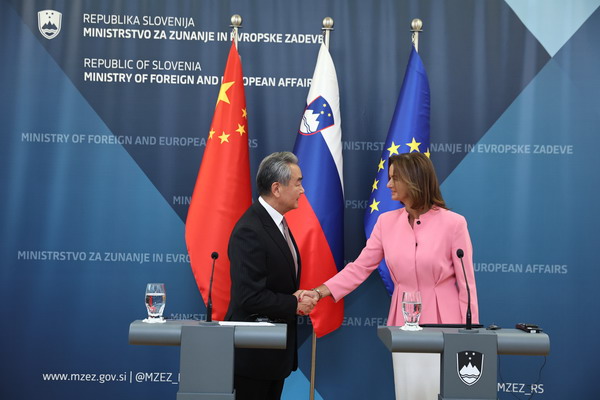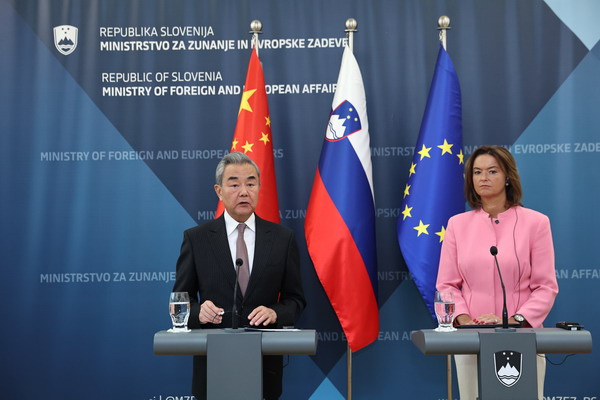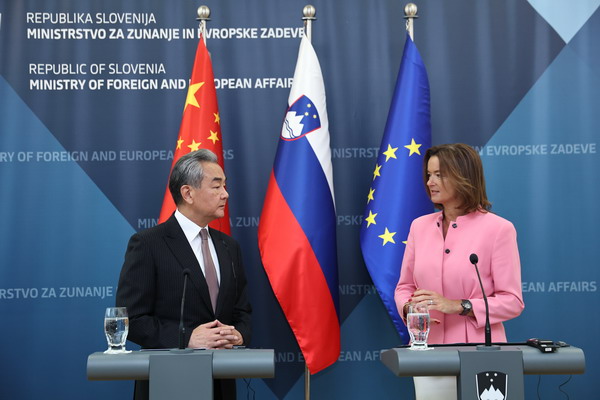
People’s Republic of China


On September 13, 2025 local time, Member of the Political Bureau of the CPC Central Committee and Foreign Minister Wang Yi and Slovenian Deputy Prime Minister and Minister of Foreign and European Affairs Tanja Fajon met the press after their talks in Ljubljana.
Wang Yi said that the talks between the two sides were comprehensive and in-depth, with broad consensus reached. They talked about friendship. China was among the first countries to establish diplomatic relations with Slovenia. A consistent tradition of China's diplomacy is that all countries, big or small, are equal. For more than 30 years, no matter how the international situation has changed, China has maintained the continuity and stability of its foreign policy. China and Slovenia have always treated each other as equals, fostering friendship, cooperation and mutual benefit, which sets an example of how countries of different sizes and social systems can coexist in harmony. Time has fully proved that China and Slovenia are trustworthy friends and partners to each other. A monument stands in central Ljubljana as a vivid portrayal of the friendship between China and Slovenia. China is willing to work with Slovenia to continuously strengthen practical cooperation in various fields, bring more benefits to the two peoples and write a new chapter of China-Slovenia friendship.

They talked about peace. This year marks the 80th anniversary of the victory of the World Anti-Fascist War. Globally, the Chinese people's resistance against aggression began the earliest and lasted the longest, with a huge price of 35 million military and civilian casualties. The Chinese people defeated Japanese militarism on the main battlefield in the East and prevented it from joining forces with the fascist forces in Europe, making an important contribution to the ultimate victory of World War II. The tenacious and unyielding resistance of the Chinese people has won widespread sympathy and support among the peace-loving people in Europe. Today, all should remember history and honor fallen heroes to cherish peace and create a better future. At present, the international situation is characterized by intertwined chaos and continuous conflicts. China and Europe should be friends rather than rivals, and should cooperate rather than confront each other. Making the right choices amid the changes unseen in a century demonstrates the responsibilities that both sides should fulfill towards history and the people.
They talked about the future. On the occasion of the 80th anniversary of the founding of the United Nations (U.N.) and in the face of the continuous emergence of global challenges and the ever-worsening governance deficit, President Xi Jinping has proposed the Global Governance Initiative in response to the call of the U.N. and the aspirations of all countries. China's intentions are transparent and sincere, as it seeks neither to start all over again nor to replace any other country. Instead, China aims to work with all responsible countries around the world to improve global governance through reform, adapt it to the requirements of the new era, truly safeguard the U.N. Charter, effectively practice multilateralism and better promote human development and progress. This is an inherent part of China's fulfillment of its duties as a permanent member of the U.N. Security Council. Wang Yi expressed the belief that this goal is precisely what Europe expects and is in line with Europe's interests. China is willing to work with European countries, including Slovenia, to inject more stability and stronger positive energy into the international situation and create a brighter future for the world.
Wang Yi said that China is a responsible major country and has the best track record in terms of peace and security. War cannot solve problems, and sanctions will only further complicate them. China does not participate in or plan wars, and what China does is to encourage peace talks and promote political settlement of hotspot issues through dialogue. The most important thing at present is to promote multilateralism, strengthen multilateral mechanisms and jointly safeguard the purposes and principles of the U.N. Charter.




